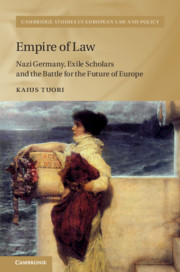Book contents
- Empire of Law
- Cambridge Studies in European Law and Policy
- Empire of Law
- Copyright page
- Dedication
- Contents
- Figures
- Preface
- Abbreviations
- 1 Introduction
- 2 Legal Refugees from Nazi Germany and the Idea of Liberty
- 3 Redefining the Rule of Law, Jurisprudence and the Totalitarian State
- 4 The Long Legal Tradition and the European Heritage in Nazi Germany
- 5 Reconfiguring European Legal Tradition after the War
- 6 The European Narrative and the Tradition of Rights
- 7 Conclusions
- Bibliography
- Index
2 - Legal Refugees from Nazi Germany and the Idea of Liberty
Published online by Cambridge University Press: 23 March 2020
- Empire of Law
- Cambridge Studies in European Law and Policy
- Empire of Law
- Copyright page
- Dedication
- Contents
- Figures
- Preface
- Abbreviations
- 1 Introduction
- 2 Legal Refugees from Nazi Germany and the Idea of Liberty
- 3 Redefining the Rule of Law, Jurisprudence and the Totalitarian State
- 4 The Long Legal Tradition and the European Heritage in Nazi Germany
- 5 Reconfiguring European Legal Tradition after the War
- 6 The European Narrative and the Tradition of Rights
- 7 Conclusions
- Bibliography
- Index
Summary
This chapter starts out with Fritz Schulz’s famous principles of liberty and humanity as the foundation of Western legal tradition, outlining how he presents the Roman legal tradition as a counterargument against Nazi legal theory. From Schulz’ s idealization of Roman law against the Nazi politicization of law, the chapter expands on the central role of legal science in maintaining the autonomy and humanity of law. These themes are then compared with other exiled scholars, such as Hannah Arendt, Franz Neumann and Arnaldo Momigliano, showing how they developed the idea of liberty and what influences they took from the Atlantic discourse.
- Type
- Chapter
- Information
- Empire of LawNazi Germany, Exile Scholars and the Battle for the Future of Europe, pp. 40 - 86Publisher: Cambridge University PressPrint publication year: 2020

